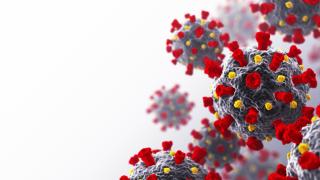City of Hope’s Joseph Alvarnas, M.D., compares how the immune system normally works – and a hyper activation of it known as cytokine release syndrome (CRS) – to the difference in wind movements.
“It’s similar to the difference between a wind that can help push a sailboat across a lake versus a hurricane,” said Alvarnas, City of Hope clinical professor in the Department of Hematology & Hematopoietic Cell Transplantation. “Under normal circumstances, our immune system works in ways that activate the immune system, and then, in a very controlled fashion, deactivate it. In cytokine release syndrome, what you see is a hyper activation that can manifest in a lot of ways.”
The reaction is particularly relevant because patients infected with COVID-19 – and whose condition worsens and require hospitalization – are being admitted with severe CRS, also known as cytokine release storm, causing severe lung damage, according to a recent study in The Journal of Clinical Investigations.
City of Hope doctors have extensive experience dealing with CRS. Some patients who receive a cancer treatment known as chimeric antigen receptor (CAR) T cell therapy may experience severe CRS after receiving these cells. When cytokine (a protein released by immune and other cells) levels are significantly elevated, CAR T patients are admitted to an intensive care unit with ventilator support, which is also part of the current treatment plan for COVID-19 patients.
Research underway
Because City of Hope doctors have treated CRS successfully, they are investigating if therapies that work against CRS in cancer patients can also treat the syndrome in COVID-19 patients.
Chinese COVID-19 diagnosis and treatment guidelines state that if there is evidence of elevated levels of a certain type of cytokine, the drug tocilizumab might be considered to treat CRS, said Elizabeth Budde, City of Hope assistant professor in the Department of Hematology & Hematopoietic Cell Transplantation, who has treated CAR T patients. (Tocilizumab is a monoclonal antibody that blocks the release of inflammatory proteins that cause a cytokine release syndrome in the lungs.)
“Tocilizumab provides some promise for certain COVID-19 patients in critical condition,” Budde added. “But it can’t be generalized to all COVID-19 patients since it can also suppress the immune system and has other side effects. It is best to enroll patients in a clinical trial so that they can be closely monitored while we get an answer.”
In addition to testing whether tocilizumab works against COVID-19, more research needs to be done on the best timing in a treatment plan for patients, and whether using the drug decreases the need for a ventilator, said Tanya Dorff, M.D., a City of Hope associate clinical professor in the Department of Medical Oncology & Therapeutics Research, who is leading a CAR T cell trial for advanced prostate cancer.
City of Hope doctors are also researching whether therapies used for other diseases might work against the virus and the CRS it may cause.
Promising drug combo
COVID-19 patients with pneumonia have a high mortality rate due to extensive inflammation in the lungs. One potential treatment combines leflunomide, an anti-inflammatory drug approved by the U.S. Food and Drug Administration (FDA) to safely treat autoimmune diseases such as rheumatoid arthritis, and tocilizumab (a monoclonal antibody that blocks the release of inflammatory proteins that cause CRS In the lungs); a City of Hope clinical trial demonstrated leflunomide’s effectiveness in treating multiple myeloma. Leflunomide has been shown to inhibit the replication of COVID-19, an RNA virus.
A proposed clinical trial using both therapies could start within weeks for cancer patients with COVID-19. Led by principal investigator Sanjeet Dadwal, M.D., City of Hope chief of the Division of Infectious Diseases, and co-investigator Steven Rosen, M.D., City of Hope’s provost and chief scientific officer, the trial will investigate if leflunomide, an oral generic drug, and tocilizumab can stop COVID-19.
City of Hope plans to work with medical centers who are treating COVID-19 cancer patients to enroll them in the trial.
“Our clinical trial will help us determine if this therapeutic combination can be a lifesaving treatment for COVID-19 patients,” said Rosen, who is also the Irell & Manella Cancer Center Director's Distinguished Chair and Morgan & Helen Chu Director's Chair of the Beckman Research Institute.
“As City of Hope physicians who treat a wide range of viruses in cancer patients, we need to use our expertise to treat COVID-19 and, in particular, to find new treatments against this devastating virus,” Dadwal added.
“We're still learning a lot about COVID-19, and there are some very innovative ideas, including the City of Hope trial and research,” Alvarnas added. “As City of Hope doctors caring for cancer patients who may have weakened immune systems, we will continue to push forward to find innovative treatments against this deadly virus.”
